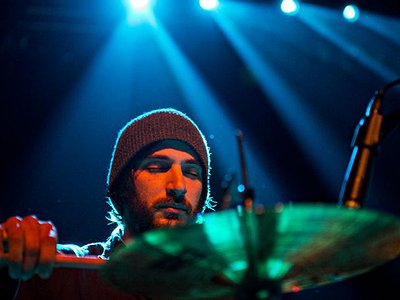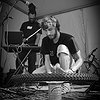Name: Rob Frye
Nationality: American
Occupation: Musician / multi-instrumentalist
Bands/Projects: Cave / Bitchin' Bajas / Flux Bikes / Exo Planet / Sueñolas / Circuit des Yeux / El is a Sound of Joy
Labels: Drag City / Lake Paradise Records / Catholic Tapes
Musical Recommendations: How about clarinetist John Carter / Kurdish singer Berfin Aktay
When did you start playing your instrument, and what or who were your early passions or influences?
Guitar, let's see I was 10. Sax was 11 in a school band situation. We had a cool director, so going to band was a high point of the school day. Early passions? I checked out the music that was around and tried to see what was up with my instruments. I would play the few open chords I knew on each fret of the guitar and hear the different harmonies against the open strings. I got into Miles and Trane, those were maybe the first really influential music figures for me, learning about the career path of an artist and about devotion to an instrument. Other passions were rock climbing, Star Wars, and riding bicycles.
For most artists, originality is first preceded by a phase of learning and, often, emulating others. What was this like for you? How would you describe your own development as an artist and the transition towards your own voice?
Hmmm. I guess I would say that for me that process is gradual and constant, not a linear trajectory; it extends out in all directions. I try to keep learning new things, which does imply emulating something. Somewhere along the line the things you've been practicing and thinking about click in your head, and you break through to the next level. Where you go from there requires some choice/voice.
Tell me about your instrument, please. How would you describe the relationship with it? What are its most important qualities and how do they influence the musical results – and possibly even your own performance?
My instruments are woodwinds (saxes, flutes, clarinets), guitars, percussion, sampler, and synthesizer. Rather conventional. I also use contact mics to amplify small sounds of everyday objects, which essentially makes any object into an amplified instrument. This has led me down a wormhole of playing repetitive, rhythmic music on bicycle wheels/tires [Flux Bikes]. Nope, it's not like Frank Zappa. At all. Getting (or discovering) new instruments is a fun way for me to find new sounds and provide a break from axes I'm playing a lot. One way I like to work is by setting up a challenge and seeing what process I can find that will yield results. Like seeing just how groovy and polyrhythmic I can make a bike wheel sound, which only has a few sounds.
Many artists feel as though, at some point, certain people gave them the ”permission to do certain things”. How was that for you – in which way did the work of particular artists before you “allow” you to take decisions which were vital for your creative development?
One permission I received that sticks out in my mind came from Fred Anderson. He gave me the permission to enter his club, the Velvet Lounge even though I wasn't quite 21. If you had your horn, you were there to play, and he would wave you through. Attending the jam session with older players --- vital for creative development.
What were some of your main artistic challenges when starting out as an artist and in which way have they changed over the years?
Laying out is one of the hippest things you can do. Even interviews need space, so I'm going to skip this question.
What do improvisation and composition mean to you and what, to you, are their respective merits?
So, maybe we can think of a spectrum to classify what is improvisation or composition. On the far left side we have 100% improv. This would be like if you had a new object or instrument, patch, scale, whatever and you dive into it. You have no idea what sound is going to come out, you just try things and experiment. You don't have a plan or ideas about what you are going to do, but once it starts happening you follow it wherever it takes you. You make it up as you go along, its a special thing.
Moving right on the spectrum we see a more common form of improvisation. Most of the time if we use the word 'improvisation' we are talking about musicians playing with a form, a melody, a mode, or some pattern or structure they've practiced, or at least considered before as part of the overall musical language. You can improvise with rhythm, explore sequences, cycles, whatever. All this stuff is part of a musician's personal concept or approach, no matter how conscious of it they might be. As music happens, musicians will have to make choices that they are at least somewhat familiar with. You can interrupt the inner process of thinking/decision making in many ways, and that's where the fun begins. Many people do this on their instruments that they've practiced for years- maybe they invent some alternate process to work with, or they simply quiet their mind and play without thinking, just feeling their way through it. That kind of playing can take you back towards the left side of the spectrum. Or you could say that the more you remove yourself, the closer you are to 100% improv.
Shifting focus, if we look all the way right, we see 100% composition. This could be a symphony or any written-out score. In this kind of music, all of the structures and instructions are organized before hand. Everything is pre-determined, maybe it leaves a section open for some 'improvisation.' What I think is cool is that there is room for both improvisation and composition inside of each other, and these hybrids in the middle spectrum are interesting. In regards to the merits of improvisation, it's arriving at the unexpected. You react to the moment rather than construct it. The merits of composition? – it's pure in its own way and can get directly to a mood or gesture without the search.
How do you see the relationship between sound, space and performance and what are some of your strategies and approaches of working with them?
Space, sound, and performance are all intertwined. How a space sounds to your ears will affect your performance, especially if you are improvising. My strategy is to do what I can to make it sound cool, is that an answer?
If it's a big space you might have to rely on a sound person, so you work with them to get it 'right.' Remember that in the end it will sound different to every single person in the room, so don't get too hung up in the sound. I love playing in stairways, tunnels, by lake Michigan, it's all valid. Bitchin' Bajas are always considering our environment, how it sounds, and how it affects our performance and the experience of the listeners.
Derek Bailey defined improvising as the search for material which is endlessly transformable. Regardless of whether or not you agree with his perspective, what kind of materials have turned to be particularly transformable and stimulating for you?
That's one cool definition of it! You can look for variations within material, and also vary your perspective on any material. And I think the search itself is transformative. For me, a big part of the search isn't actively seeking, but staying aware and following up.
By chance I met some musicians from Mexico who play (and live) in the Son Jarocho style: Joel Cruz Castellanos, Leo Heiblum, and Fredi Vega and some of their crew which spans generations. My twin brother and I visited these new friends in Mexico City and Vera Cruz and after hanging around and absorbing the landscape and culture, we were able to take home an unforgettable experience and some beautiful handmade guitars. People are sleeping on Son Jarocho! It woke me up with a jolt when I heard it. The musicianship is so deep: talk about material that is endlessly transformable!
For me approaching this style, learning about it, playing it and thinking about it, I wanted to transform the inspiration I felt into something that was authentic to my own experience. I arrived at my own way through a sampling process I’ve been working on, and made a project called 'Sueñolas,' which is an imagined word mixing sueños (dreams) with olas (waves). Lake Paradise (Chicago, IL) just released a split double tape of Flux Bikes and Sueñolas, scope it out!



